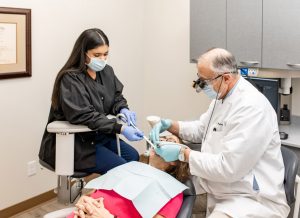Restore Your Oral Health and Smile
Maintaining optimal oral health is essential for a bright and healthy smile, but sometimes routine dental cleanings aren’t enough to address significant plaque and tartar buildup. That’s where gross debridement cleaning steps in—a vital procedure designed to restore your oral health when standard cleanings fall short.
At Pinnacle Dental in Farmington, CT, we break down what gross debridement cleanings are, helping patients reclaim healthy gums and teeth. Call our Farmington dental practice today at (860) 470-3660 to schedule your appointment.
What Is a Gross Debridement Cleaning?
A gross debridement cleaning is a deep dental cleaning performed by a dental hygienist or dentist when plaque and tartar buildup are too significant for a typical dental cleaning. This procedure is crucial for those who haven’t had a cleaning in a while or have gum disease (periodontal disease).
The full-mouth debridement procedure involves removing plaque, tartar, and debris from the teeth and gums. Using specialized dental tools, your dentist or dental hygienist thoroughly cleans the gum line, ensuring your teeth and gums are free from harmful buildup. This process might take longer than a standard cleaning and can cause some discomfort due to the extensive dental procedures involved.
While gross debridement cleaning is essential in addressing severe periodontal disease, it doesn’t replace regular cleanings. It’s the first step in restoring dental health after neglecting dental hygiene.
The Benefits of Gross Debridement Cleanings
A gross debridement cleaning can provide numerous benefits to your oral health, including:
- Removes plaque and tartar buildup above and below the gum line
- Helps prevent gum disease and tooth decay
- Promotes healthy gums and teeth
- Reduces gum inflammation and helps prevent infection
- Improves overall oral health and hygiene
- Helps maintain a bright and healthy smile
When Gross Debridement Cleaning Is Necessary
Gross debridement cleaning is typically recommended when there’s excessive plaque and tartar buildup that hasn’t been addressed through regular cleanings in many years. This can lead to periodontal disease, tooth decay, and other oral health issues.
You might need a gross debridement cleaning if you notice:
- Excessive plaque and tartar buildup on your teeth
- Bleeding gums when brushing or flossing
- Persistent bad breath or a bad taste in your mouth
- Swollen or tender gums
- Loose teeth or changes in how your teeth fit together when biting
- Receding gums or teeth that appear longer than normal
- Signs of infection, like pus around your teeth or gums
If you notice any of these signs, it’s essential to seek dental care. Call Pinnacle Dental at (860) 470-3660 to schedule your full mouth debridement cleaning.
How Debridement Cleaning Works
The gross debridement cleaning process involves several steps to ensure that your teeth and gums receive a thorough cleaning:
- Evaluation: The first step is an assessment of your oral health. This includes taking X-rays to check for periodontal pockets and a comprehensive examination of your teeth, gums, and oral health issues.
- Scaling and Root Planing: Using specialized tools, your dental professional will remove plaque, tartar, and bacteria from above and below the gum line. Root planing smooths out the surfaces of your teeth roots to prevent further plaque buildup.
- Antibacterial Rinse: After the scaling and root planing, your dentist will use an antibacterial mouth rinse to eliminate any remaining bacteria and promote healing.
- Post-Cleaning Evaluation: After the cleaning, your dentist will assess your oral health to determine if further treatments, like fluoride application or additional periodontal therapy, are required.
The process can take from one to four hours, depending on the extent of plaque buildup. Your dental specialist will provide local anesthesia to ensure comfort during the procedure.
Caring for Your Teeth After Your Debridement Cleaning
After your gross debridement cleaning, proper care is essential to promote healing and prevent future buildup:
- Gentle Brushing: Use a soft-bristled toothbrush to clean your teeth twice daily. Be gentle to avoid further irritation to tender gums.
- Flossing Carefully: Floss once a day to remove plaque between your teeth, but be gentle to avoid injury.
- Rinse with Antimicrobial Mouthwash: Using an antimicrobial mouthwash can help reduce bacteria and promote healing.
- Avoid Harsh Foods: For the first few days, avoid hard, crunchy, or spicy foods that could irritate your gums.
- Maintain Regular Dental Cleanings: To avoid the need for future gross debridement cleanings, schedule regular cleanings every six months or as recommended by your dentist.
The Cost of a Gross Debridement Cleaning
The cost of a gross debridement cleaning typically ranges from $75 to $200. This price may vary based on the extent of the cleaning, your dental insurance coverage, and the location of your dental practice. Always check with your insurance provider to understand your coverage and out-of-pocket expenses.
Frequently Asked Questions
The gross debridement cleaning procedure itself is usually not painful due to the use of a local anesthetic. However, some discomfort may occur, such as soreness or tenderness in the gums, which should subside within a few days.
The gross debridement cleaning procedure typically takes between 30 minutes to an hour, depending on the severity of the plaque buildup.
Yes, dental sedation options are available if needed during a gross debridement cleaning procedure. Your dentist or dental specialist will discuss the best options for your comfort.
Discover What Our Farmington Dentist Can Do for You
If you’re in the Farmington area and experiencing gum disease or other oral health issues, it’s time to talk to your dentist about gross debridement cleaning. Restore your oral health with a full mouth debridement cleaning and prevent further damage to your teeth and gums.
Contact Pinnacle Dental at (860) 470-3660 to schedule your consultation. We proudly serve patients in Farmington, Plainville, New Britain, Hartford, Newington, and surrounding areas.


